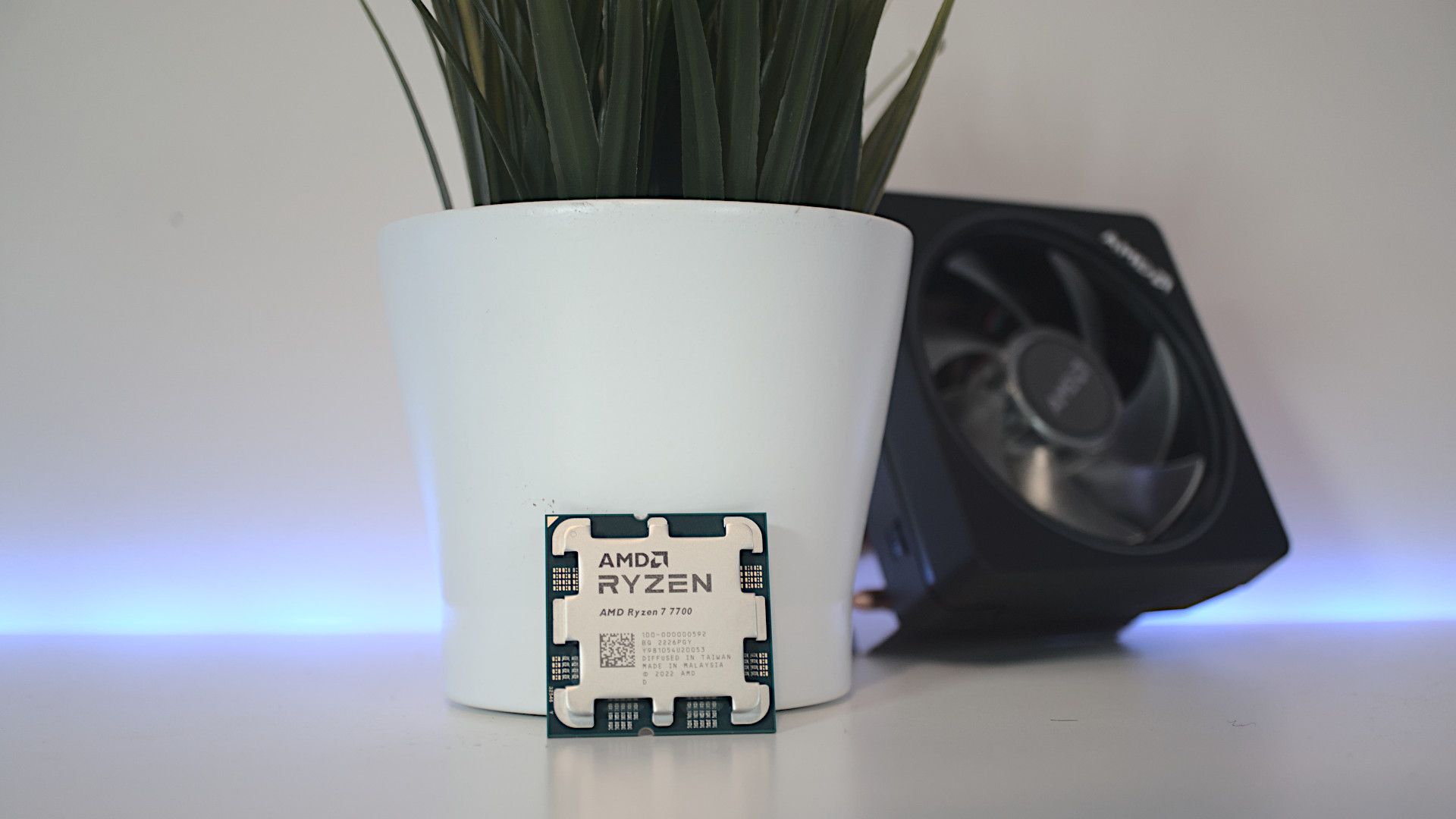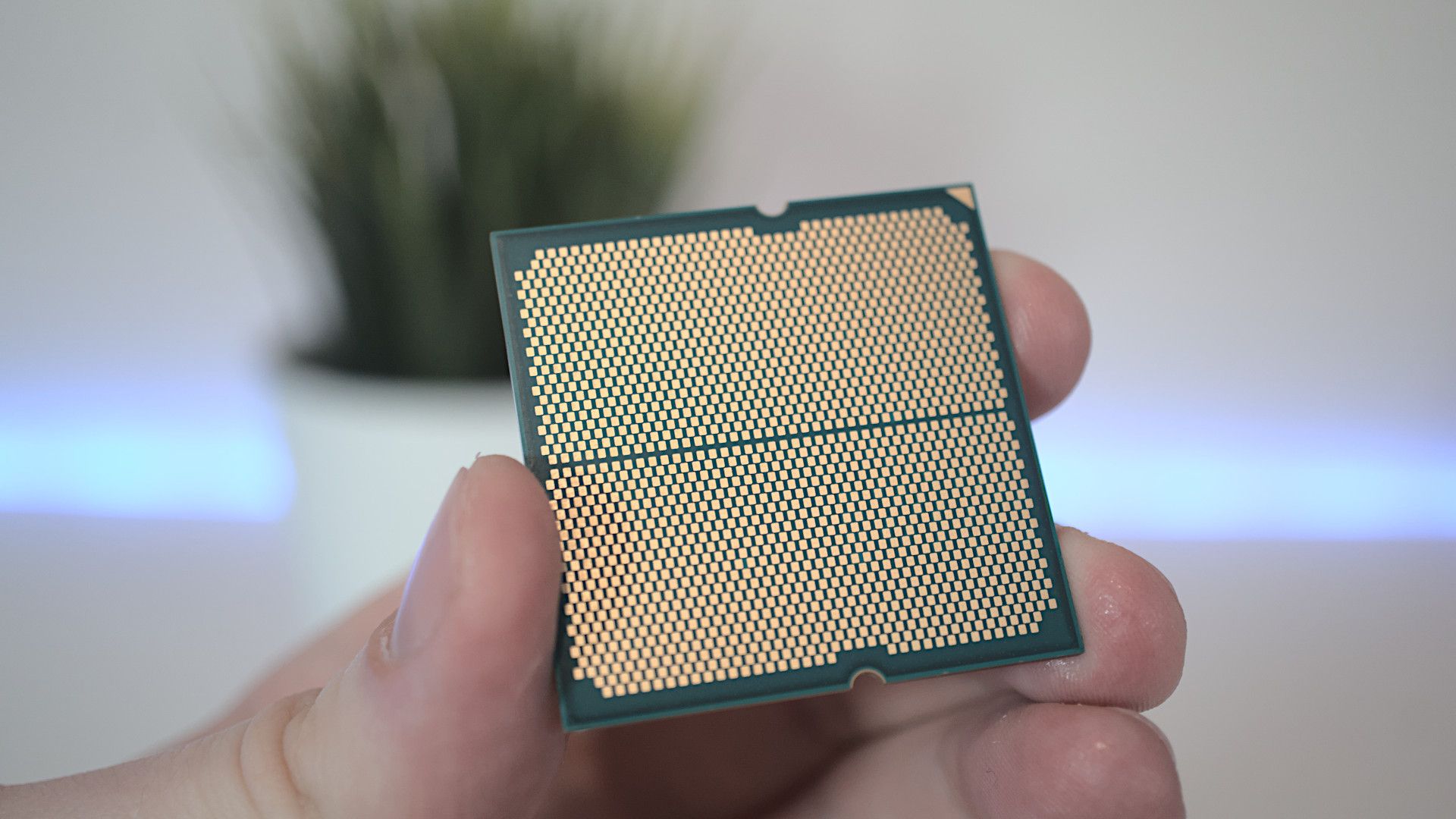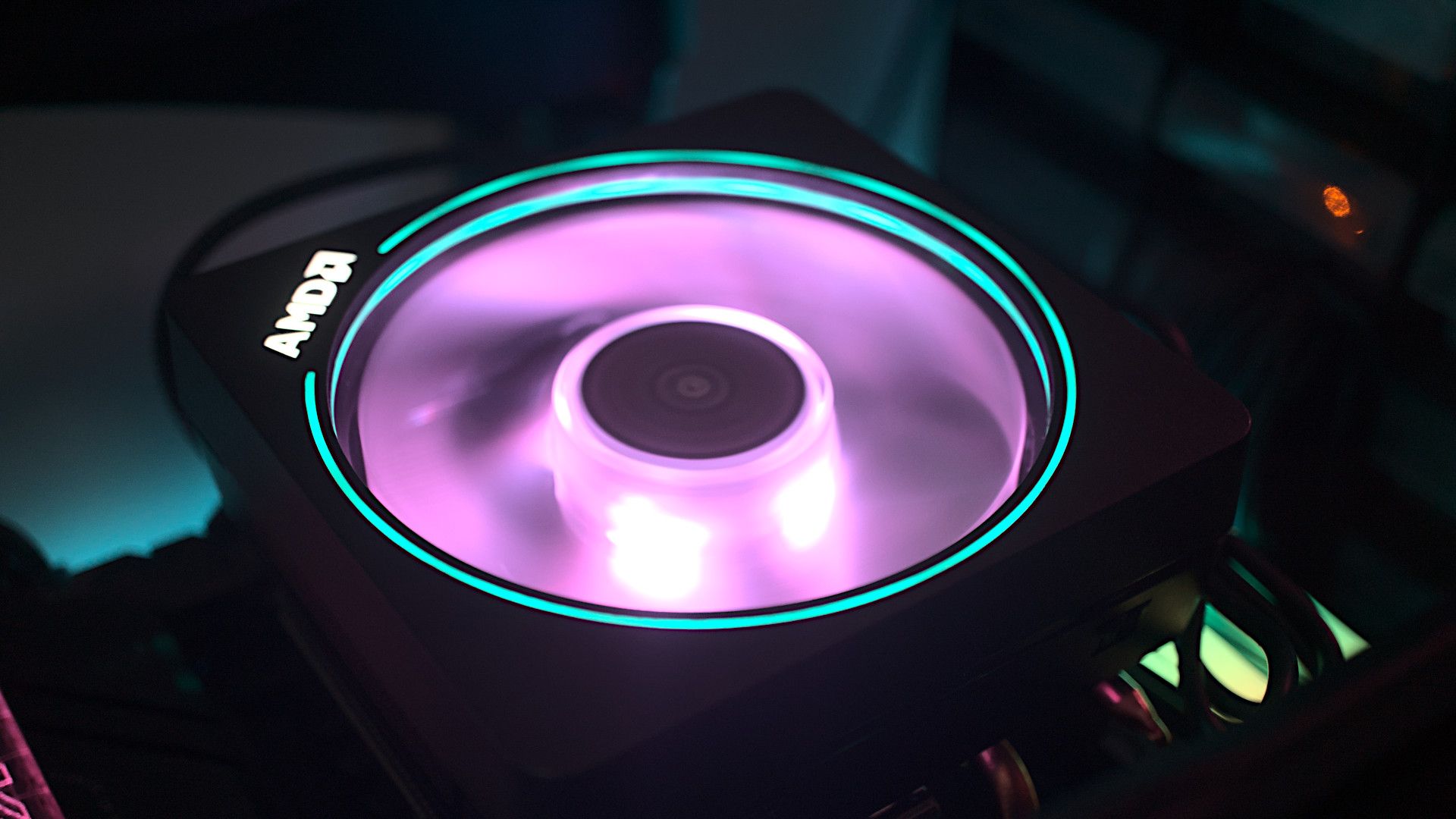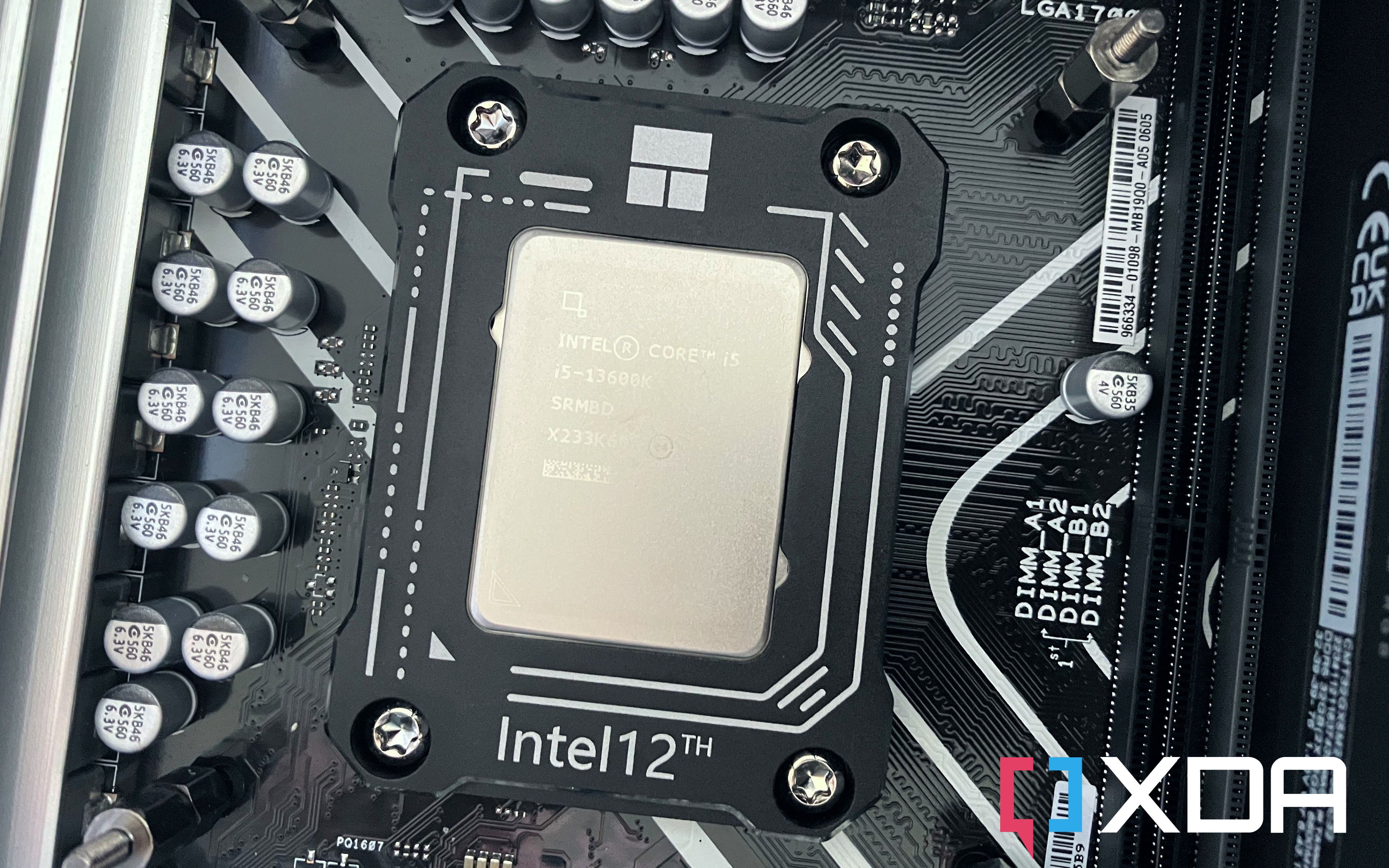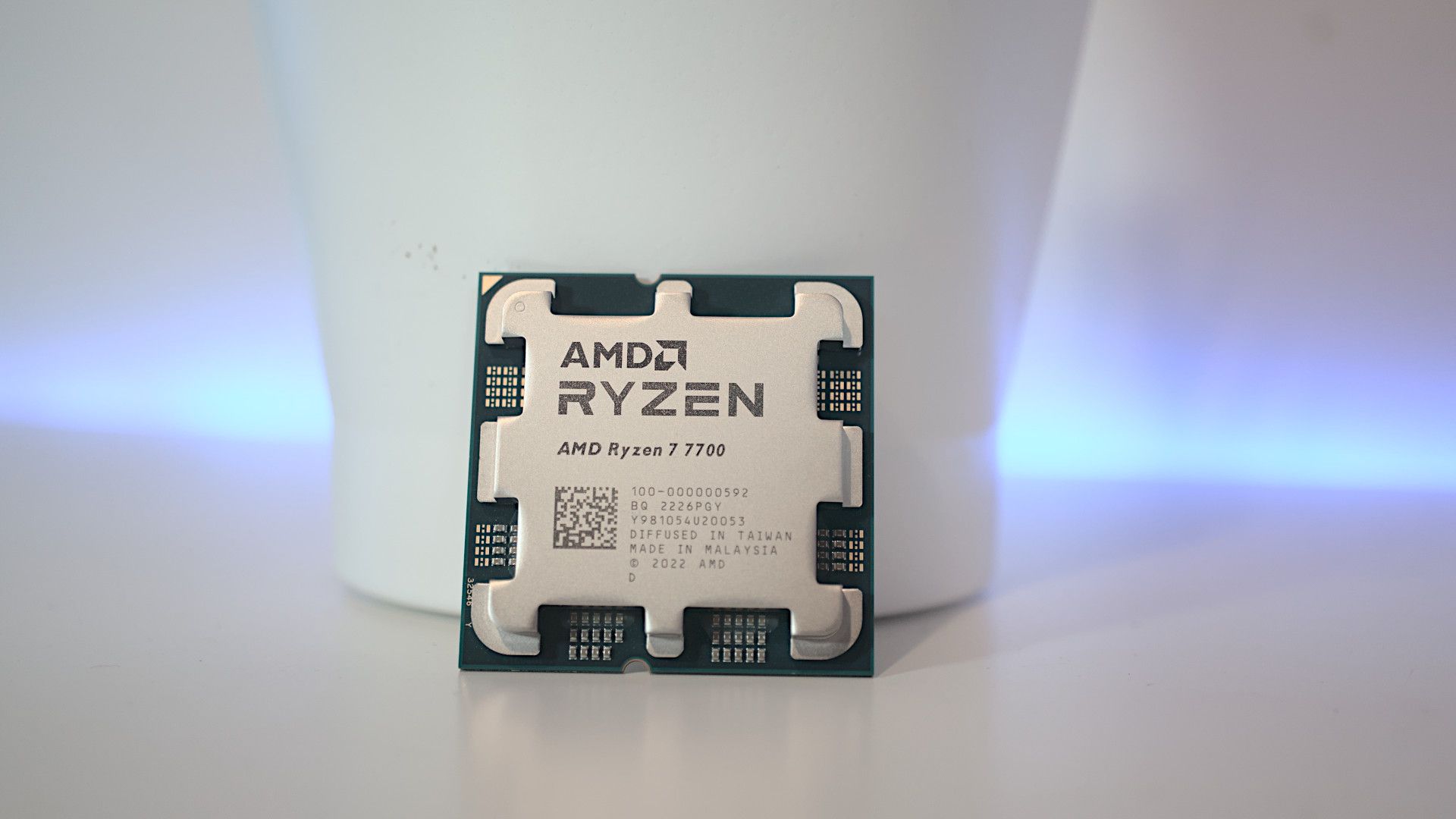AMD launched three new 65W Ryzen 7000 series desktop processors to kick off 2023, allowing you to build systems that don't produce as much heat or draw as much power. We found the 105W AMD Ryzen 7000 series CPUs to be among the best out there, easily capable of going up against Intel but noted high operating temperatures.
In this review, we're going to be looking at the AMD Ryzen 7 7700, a slightly less capable Ryzen 7 7700X, which you could think of as having eco-mode enabled. We'll run through its pricing, performance, and how it compares against the competition for the best CPU crown.
AMD Ryzen 7 7700
The AMD Ryzen 7 7700 is an 8-core processor with 16 cores, the ability to boost up to 5.3GHz, and yet has a TDP of just 65W. It's a solid mid-range chip from AMD for general use or gaming.
- Brand
- AMD
- Cores
- 8
- Threads
- 16
- Architecture
- Zen 4
- Process
- 5nm
- Socket
- AM5
- Transistors
- 6.57 billion
- Base Clock Speed
- 4.3 GHz
- Boost Clock Speed
- 5.3 GHz
- Cache
- 33 MB
- RAM
- DDR5-5200
- PCIe
- 5.0
- TDP
- 65 W

|
Pros |
Cons |
|---|---|
|
8 cores, 16 threads |
Not that much cheaper |
|
Great gaming performance |
Fewer cores than Intel |
|
Better value than 7700X |
No DDR4 RAM support |
|
DDR5 RAM and PCIe 5.0 |
Pricing and availability
The AMD Ryzen 7 7700 launched on January 10 for $329, which is a pretty good price for an eight-core processor with these clock speeds. But this turns out to be a bad deal when you consider how much the Ryzen 7 7700X cost prior to this month. It was available for $345, but has since been pushed back up to near the MSRP at $399.
It would have been better for AMD and retail partners to coordinate a launch for the 7700 to be priced at $300. The Intel Core i7-13700 is a close contender in terms of SKU, but costs the same as the Ryzen 7700X at around $390. We'll be comparing the new 65W Ryzen 7 7700 against the Ryzen 7 7700X and Intel Core i7-13700K in this review.
Zen 4: Architecture & features
The new Zen 4 architecture and AM5 platform were launched in 2022 for the new AMD Ryzen 7000 series processors. The company made notable changes compared to the previous 5000 series chips by adding support for DDR5 RAM, PCIe 5.0, and improving overall performance and efficiency. Now, we're looking at some slightly slower chips with a TDP of 65W.
|
AMD Ryzen 5 7600 |
AMD Ryzen 7 7700 |
AMD Ryzen 9 7900 |
|
|---|---|---|---|
|
Cores |
6 |
8 |
12 |
|
Threads |
12 |
16 |
24 |
|
Max boost clock |
Up to 5.1 GHz |
Up to 5.3 GHz |
Up to 5.4 GHz |
|
Base clock |
3.8 GHz |
3.8 GHz |
3.7 GHz |
|
L1 cache |
384 KB |
512 KB |
768 KB |
|
L2 Cache |
6 MB |
8 MB |
12 MB |
|
L3 Cache |
32 MB |
32 MB |
64 MB |
|
Default TDP |
65 W |
65 W |
65 W |
|
Processor technology for CPU cores |
TSMC 5nm FinFET |
TSMC 5nm FinFET |
TSMC 5nm FinFET |
|
Unlocked for overclocking |
Yes |
Yes |
Yes |
|
CPU socket |
AM5 |
AM5 |
AM5 |
|
Thermal solution |
AMD Wraith Stealth |
AMD Wraith Prism |
AMD Wraith Prism |
|
Max. operating temperature (Tjmax) |
95 degrees C |
95 degrees C |
95 degrees C |
|
Memory channels |
2 |
2 |
2 |
|
Max memory speed |
DDR5-5200 |
DDR5-5200 |
DDR5-5200 |
|
Graphics |
AMD Radeon, two cores |
AMD Radeon, two cores |
AMD Radeon, two cores |
|
Graphics frequency |
2,200 MHz |
2,200 MHz |
2,200 MHz |
|
GPU base |
400 MHz |
400 MHz |
400 MHz |
|
Price |
$229 |
$329 |
$429 |
The same requirements are set as other Ryzen 7000 processors whereby you will need an AM5 motherboard and no support for older DDR4 modules is available, so it's a better option for those who are looking to replace almost everything inside their PC or start a new build from scratch. These new 65W processors will work well with X670, X670E, B650, and B650E chipsets on the best motherboards.
Performance
To test the AMD Ryzen 7 7700, we installed the CPU in the same test bench PC as the AMD Ryzen 7 7700 and Ryzen 9 7900. This consisted of the following:
- Gigabyte X670E Aorus Master motherboard
- 64GB Kingston Fury DDR5-7200 RAM
- AMD Radeon RX 7900 XTX
- FSP Dagger Pro 850W PSU
- Stock coolers and be quiet! Pure Loop 2 FX AIO
AMD sent us a stock cooler for each of the three 65W Ryzen 7000 processors. We used them to see how the performance and thermal results would be if you purchased the processors and not use an aftermarket cooler. For comparison, we also deployed the be quiet! Pure Loop 2 FX AIO with a 360mm radiator and three fans.
CPU-Z, Geekbench 5, and 7-Zip
CPU-Z, Geekbench, and 7-Zip put a processor to the test and allow us to compare hard figures for reviews such as this. 7-Zip is more of a real-world test for compressing and decompressing data.
|
Test |
AMD Ryzen 7 7700 |
AMD Ryzen 7 7700X |
Intel Core i7-13700K |
|---|---|---|---|
|
CPU-Z (Higher is better) |
759 / 7,450 |
791 / 7,831 |
869 / 11,942 |
|
Geekbench 5 (Higher is better) |
2032 / 13,502 |
2,174 / 14,162 |
2,129 / 21,099 |
|
7-Zip (Higher is better) |
102 MB/s / 1,467 MB/s |
101 MB/s / 1,513 MB/s |
133 MB/s / 1,825 MB/s |
All three tests worked well, and we saw positive results from the 65W chip. It was able to keep up with its 105W sibling with nothing but the stock cooler installed.
Cinebench R23, HandBrake, and Corona 1.3
Next, we'll see how the chip fares with rendering by utilizing the more intensive Cinebench, HandBrake, and Corona test suites.
|
Test |
AMD Ryzen 7 7700 |
AMD Ryzen 7 7700X |
Intel Core i7-13700K |
|---|---|---|---|
|
Cinebench R23 (Higher is better) |
1,929 / 18,076 |
1,979 / 18,938 |
2,129 / 27,231 |
|
Corona 1.3 (Lower is better) |
75 s |
75 s |
51 s |
|
HandBrake (Lower is better) |
1,790 s |
1,671 s |
1,291 s |
It's a similar story once again where the AMD Ryzen 7 7700 comes in just behind its slightly more powerful X sibling. And that repeats itself in games and other scenarios. It would perform about as well as a slightly underclocked Ryzen 7 7700X or one with eco-mode enabled. Since you wouldn't want to do that with a desktop-class processor, this makes the Ryzen 7 7700 quite the chip since it also supports overclocking.
Temperatures were largely kept in check with the included stock cooler. The results in the charts were obtained using the included cooler to simulate the performance one could expect without purchasing an aftermarket cooling solution. We didn't see the CPU pass 78C and it remained at about 76C at a sustained high load. Power-wise, you can expect the AMD Ryzen 7 7700 to draw 90W of power.
Competition
The main competition for the AMD Ryzen 7 7700 is AMD's own Ryzen 7 7700X. It has the same specifications aside from TDP and clock speeds. The Ryzen 7 7700X has a faster base clock speed of 4.5GHz, as well as a higher boost clock speed of 5.4GHz. The rest of the specifications are almost identical. Because of this, you can expect a slight dip in performance at stock settings with the more affordable Ryzen 7 7700.
|
AMD Ryzen 7 7700 |
AMD Ryzen 7 7700X |
|
|---|---|---|
|
Cores |
8 |
8 |
|
Threads |
16 |
16 |
|
Max boost clock |
Up to 5.3 GHz |
Up to 5.4 GHz |
|
Base clock |
3.8 GHz |
4.5 GHz |
|
L1 cache |
512 KB |
512 KB |
|
L2 Cache |
8 MB |
8 MB |
|
L3 Cache |
32 MB |
32 MB |
|
Default TDP |
65 W |
105 W |
|
Processor technology for CPU cores |
TSMC 5nm FinFET |
TSMC 5nm FinFET |
|
Unlocked for overclocking |
Yes |
Yes |
|
CPU socket |
AM5 |
AM5 |
|
Thermal solution |
AMD Wraith Prism |
- |
|
Max. operating temperature (Tjmax) |
95 degrees C |
95 degrees C |
|
Memory channels |
2 |
2 |
|
Max memory speed |
DDR5-5200 |
DDR5-5200 |
|
Graphics |
AMD Radeon, two cores |
AMD Radeon, two cores |
|
Graphics frequency |
2,200 MHz |
2,200 MHz |
|
GPU base |
400 MHz |
400 MHz |
|
Price |
$329 |
$399 |
If the Ryzen 7 7700X remained at its MSRP, we'd see the launch of the AMD Ryzen 7 7700 as a great way for those who want an 8-core AMD Zen 4 processor and save a little in the process, but it's difficult to overlook the fact the X variant cost $340 before the launch of these new 65W processors. Across the aisle is Intel with the mighty Core i5-13600K and Core i7-13700K. The company recently announced the Core i7-13700, which would be a better comparison, but still comes with more cores and threads.
It's not all clear-cut between AMD and Intel, however. While AMD may be on the back foot in terms of core count, the company is using a more efficient manufacturing process and can get more performance per watt with fewer threads to work with. Regardless of whether you choose the Core i7 or Ryzen 7 SKU families, your PC will have some serious horsepower.
Should you buy the AMD Ryzen 7 7700?
You should buy the AMD Ryzen 7 7700 if:
- You don't want to spend more than $330 on a processor.
- You don't plan on doing anything super-intensive, such as regular media rendering.
- You require something a little more potent than the Ryzen 5 series.
You shouldn't buy the AMD Ryzen 7 7700 if:
- You want the best CPU performance in this segment.
- You don't already have or plan to buy a new AM5 motherboard and DDR5 RAM.
The AMD Ryzen 7 7700X is a great little processor. Sure, it gets a little too warm for our liking, but the performance available is impressive. AMD has managed to do something rather special with the Ryzen 7 7700 by lowering clock speeds and the price, but it's just a shame this effort is undercut by the fact the X version of the same chip had a street price of almost $330.
Being a 65W chip, which can happily hit 90W when under heavy loads, you'll have no issue keeping it operating at lower temperatures, but you will find that it has a lower headroom when overclocking than its more power-hungry sibling. For gaming and other tasks, this isn't an issue and the AMD Ryzen 7 7700 is more than capable of handling everything at a more reasonable price.
AMD Ryzen 7 7700
The AMD Ryzen 7 7700 is an 8-core processor with 16 cores, the ability to boost up to 5.3GHz, and yet has a TDP of just 65W. It's a solid mid-range chip from AMD for general use or gaming.

